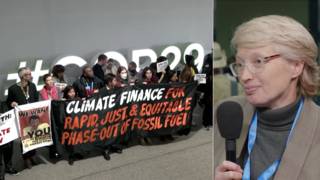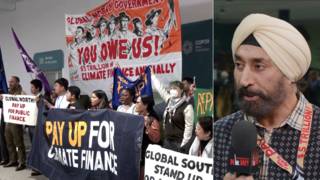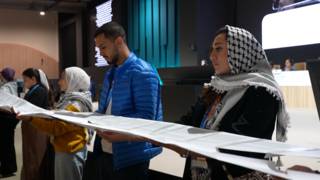
Related
In the red-baiting heydays of the early 1950s, Sen. Joseph McCarthy called Harvard a “smelly mess” where students risked “indoctrination by Communist professors.” [includes rush transcript]
In fact, Harvard cooperated closely with the FBI’s anticommunist witch-hunts. Recently uncovered files reveal the case of Raymond Ginger, a Harvard professor who was asked to resign in 1954 because he refused to respond to questions over whether he and his wife were Communists.
Guest:
- Ann Ginger, widow of Raymond Ginger, author, lawyer and activist. She is president of the Meiklejohn Civil Liberties Institute.
Transcript
AMY GOODMAN: In the red-baiting heydays of the early 1950s, Senator Joseph McCarthy called Harvard a “smelly mess” where students risked “indoctrination by Communist professors.” He called it a “privileged sanctuary for Fifth Amendment Communists.”
In fact, Harvard cooperated closely with the FBI’s anti-communist witch hunts. Recently uncovered files reveal the case of Raymond Ginger, a Harvard professor who was asked to resign in 1954 because he refused to respond to charges that he and his wife were Communist.
We’re joined on the telephone right now by his widow, Ann Ginger, who joins us from Berkeley, where she runs the Meiklejohn Law Center. Welcome to Democracy Now!, Ann Ginger. It’s good to have you with us. Ann Ginger?
We are going to go to her in just a minute, but as we try to get her on the line again, I’m going to read a little from a Harvard Crimson article, which says, ”FBI Files Show [Harvard Business School] Forced Out Leftist Professor. Red Scare Revisited: historian quit after refusing to state his politics. The year is 1954. A pregnant woman and her newly unemployed husband board a train for New York where they will stay with relatives they have never met. The woman gives birth a month later as a charity patient at a New York hospital. The woman, Ann Fagan Ginger, says the quick flight from Massachusetts came after Harvard officials forced her now deceased husband to resign from the faculty because he refused to reveal whether he was, or had ever been, a Communist.”
Ann Ginger joins us on the line right now. Welcome to Democracy Now!
ANN GINGER: Thank you.
AMY GOODMAN: So tell us, fifty years later, what it is that you found?
ANN GINGER: Well, I went to South Africa in 1996. I’m a lawyer, and I went to the International Association of Democratic Lawyers meeting in Cape Town. And I really was impressed with the concept that people who had been mistreated — that’s a mild understatement — the way that the people in South Africa had been by the ruling circles, that they could decide that they would set up Truth And Reconciliation Commissions. I think it’s a profound idea.
And I’ve been thinking for some time that I would like to push this over onto Harvard, which pretends that it behaved in a proper fashion during the McCarthy period and has never admitted what they did, not only to Ray Ginger and to me and my family at that time and for the rest of our lives, but what they did to scholarship, to the very concept of what an academic institution should do.
And then I found out that the president of the Harvard Board of Overseers is now a woman. And more than that, the general counsel is a woman. So on September 15 this year, I finally slowly put together a letter, and I mailed them a three-page letter suggesting or urging that in the spirit of the Truth and Reconciliation Commission and our recent decision to pay reparations to the Japanese Americans for the way they were treated in 1942 and thereafter in the concentration camps, and in the spirit of the demands of the Native American people to have their treaties finally recognized, and the idea of paying compensation to the descendants of American slaves, I said that these women should be able to understand what it was like, what Harvard did to Ray Ginger, and that it was time to hold — do a study, not only of his case, but of many, many others.
AMY GOODMAN: I should say Ann Ginger is a lawyer and activist, president of the Meiklejohn Civil Liberties Institute in Berkeley, California, has edited twenty-two books on civil rights and law, the most recent one, Nuclear Weapons Are Illegal.
Let’s go back and describe what it’s like, because I think that human picture of what went on then and what it took to continue — explain what happened in 1954 with your husband. How was he approached by Harvard when he was a professor there?
ANN GINGER: Well, he was approached in the first place to come there, because he wrote a book about Eugene Debs. And the Harvard Business School had nobody from the labor side at all, so they hired him. He got a one-year contract. Then he got another one-year contract. And then in the spring of 1954, after McCarthy hearings at Harvard, which were really trying to target Harvard as a den of communist iniquity, he got a three-year contract. And no questions were asked about his politics or mine.
And then, on the particular day, which was June 16, 1954, he was called in by the Harvard Business School leadership and told that he and I, we were going to be called — according to the FBI file. I don’t recall his telling this to me, but the FBI file says that he was told that he and I were going to be called before the Un-American Committee of the state of Massachusetts. And, therefore, if he wanted to keep his job, he must take and oath, and I must take an oath that we were not and had not been members of the Communist Party.
And according to the FBI file, I’m pleased to say that they said he, quote, “flared” at being told that I would also have to take the oath, because Harvard obviously had absolutely no relationship to me. Just I happened to be the wife of a Harvard faculty member.
And so, he said that he didn’t agree to do it. And they came back the next — they said he was to come back the next morning. And the next morning they said, “Well, in view of the fact that your wife is nine months pregnant, if you will leave town instantly, we will only break your three-year contract that starts July 1. We will pay out the contract. So you’ll have two months’ pay for July and August, if you leave town immediately, meaning before you’re subpoenaed by the committee in Massachusetts.”
The flavor of the times is that, for example, I lived on Fayston Street. And one of the people who lived on Fayston Street was named Frances Hood. And she taught piano lessons. Her husband worked as a stonemason. He was also the head of the Communist Party of Massachusetts. They were human beings. They weren’t some strange character with red hair or something. Frances Hood’s people had come over on the Mayflower.
So that the spirit of the times was such, for example, that I helped write a report about McCarthyism and the problems in Massachusetts the year before for the Massachusetts Council for Constitutional Rights, which would be called a leftwing something or other today, but actually it was a combination of the Civil Rights Congress, which was on the attorney general’s list of subversive organizations, and the American Committee for Protection of Foreign Born, which was on the list of subversive organizations, but also the American Jewish Congress, the many other organizations — the American Jewish Committee, the American Civil Liberties Union. We all worked together because we saw a common problem. So that’s the situation, as of that moment.
And I think it was a Tuesday that he was called in, and Wednesday they relented and said that if we left town immediately, they would pay up two months, owing on his one-year contract. And so, you know, I’m a writer. I have papers strewn all through the house. I was going to have a baby. I had a doctor. I had a hospital. And in two days, I had to just leave all of that, hire some people who would come in to do the moving and go to New York. And all I had to do was find an inexpensive doctor and a hospital that would take me in as a charity patient and someplace to live. And then Ray had to figure out how to end his career at Harvard in such a way — that is to say, bring his books along and say goodbye to people and so forth, so that he might be able to return some day to academia.
AMY GOODMAN: Ann Ginger, tell us about who you turned to when you had to find a doctor in New York?
ANN GINGER: Well, this is another myth that’s not very clear to people today. But I went to the University of Michigan. There was a wonderful group of Marxist people, some of whom were —- Ray was an economist. I was a law student. But there a number of doctors, medical people, scientists at the University of Michigan in the mid—’40s who had a Marxist discussion group. We even had the culture vultures on Saturday night to have fun. And one of them was named Jonas Salk. And he and his wife became good friends of mine.
And so, in this difficulty, I called up Jonas and said — I found out where he was. I can’t remember now. Pittsburgh, I think. He had just — was about to get a Nobel Prize for his work on polio, the polio vaccine. And I said what had happened, and could he tell the name of a doctor in New York who would take care of me, deliver the baby at a very low price and who would get me into some hospital, because the baby was due, you know, in two weeks.
AMY GOODMAN: Jonas Salk, a Marxist?
ANN GINGER: Well, I would think he would have said that at that time. He certainly studied Marxism, and he seemed to think that these were good ideas. You know, dialectical materialism wasn’t invented by Marx and Engels. It’s a theory that developed. We’ve given its name, “Marxism.” But any person who’s trying to make change in any field, scientific or any other, has to have some method of thinking. And Jonas seemed to — certainly at that time, and I think he never, you know, denounced these ideas — were helpful in thinking things through.
And so, Jonas gave me the name of a doctor in New York who agreed to take care of me. And then I had to go to Beth Israel Hospital. And I don’t know if you’ve ever applied for relief or applied for charity, but for somebody who has never done it, it’s pretty upsetting to be, you know, treated in this way, as if you’re dirt. I wasn’t used to that.
And how could I explain that I was a lawyer and my husband was a professor, and yet we had to be in the charity ward? It’s true that once I was admitted, I was treated perfectly well. But I think people have to understand the indignity you go through when you have to ask for charity.
I might say that I’ve had this in mind for a long time, to respond to Harvard. And at the time, nobody would’ve been interested. But years later, I wrote an article for the Harvard Civil Rights-Civil Liberties Law Review about affirmative action in 1979. And in two footnotes, I told this story. And I told the editors, you can change anything in this article, but not these footnotes. And they were published. And Harvard did nothing whatever about it.
And when I wrote them this letter in September 15th, I’ve had no response, either from the president of the Harvard Board of Overseers nor from the general counsel, both of whom, as I said, are women.
And I want to make clear, I’m raising this issue now about Ray Ginger, because Harvard is perceived as being an academic institution with high standards. And that is a lie. They are not an institution with high standards. If they had had high standards, they would not have fired Ray. They would not have made life difficult for other members of the faculty. They wouldn’t have built a climate at Harvard where people did not ask questions.
And when you have that kind of a climate in which you know that if you sound left, let alone Marxist, you’re not going to get an appointment, you’re not going to get some special thing that you need, you’re not going to keep your job, then you have second-rate people like Kissinger coming forward, as if they now something. And that is dangerous to the country as a whole.
AMY GOODMAN: There’s a quote in the Harvard Crimson piece, a sidebar: “Harvard stood up to McCarthy, with exceptions.” It’s the quote of the Harvard president, Nathan Pusey, an old McCarthy rival from his Wisconsin days. And yet he said, “A member of the Communist Party is not fit to be on the faculty because he has not the necessary independence of thought and judgment.”
ANN GINGER: Well, what about Albie Sachs? I’m not sure he was a member of the Communist Party. I think he was in South Africa.
There are a lot of people who were members of the Communist Party, are members of the Communist Party, were or are members of other political viewpoints, who think well. I think that that is absurd.
And what about a rightwing Republican? I can’t see this. How could you say that — well, in any case, it isn’t true. They did — they used censorship against people, and censorship of ideas and failure to ask questions.
AMY GOODMAN: Can you end this segment with the comparisons we were talking about yesterday with who made it at Harvard and who didn’t, talking about people like Henry Kissinger?
ANN GINGER: Well, I think that’s the point. The people who did not ask questions of the establishment, who did not question the policies that led us deeply into Cold War and to military spending, those people did not get appointed. If they were students, they didn’t get on the Law Review because of their politics. If they were applying for admission, they didn’t get admitted.
And my goal is to force Harvard to do a study of what they did and didn’t do, who the victims were and who the beneficiaries were. Books were not written. Questions were not asked. That is the problem. And the whole spirit in Massachusetts was affected, and ultimately in the world, by the cowardice of the Harvard administration and their cover-up of what they did, so that there were medical students. There was one in particular who’s mentioned in the article. There were scientists of all kinds.
MIT, at the same moment, when their Professor Dirk Struik was actually indicted for conspiracy to overthrow the government of Massachusetts, MIT went on paying this Marxist scholar until his charges were dismissed. They didn’t let him teach during that time, but they went on paying him, which was highly appropriate. Harvard didn’t have the courage, and they had enough power that they kept the story from coming out in the press. And I think that that is despicable.
And the time must come. I think the United States Department of Education should question any relationship with Harvard until they come forth and admit and study what they did and what effect it had on the entire future, not only of the state of Massachusetts, but on academic thinking generally.
AMY GOODMAN: Well, it’s an interesting thought to imagine if Henry Kissinger hadn’t risen in the ranks in Harvard and became National Security Advisor and Secretary of State, but Ray Ginger had, how Vietnam, Chile, Indonesia would be different today.
Ann Fagan Ginger, I want to thank you for being with us. Ann Fagan Ginger, author and editor of many books. As well, she heads the Meiklejohn Center in Berkeley, California, has a number of newspaper articles now coming out on the Harvard papers and its relationship with the FBI and Joseph McCarthy.












Media Options